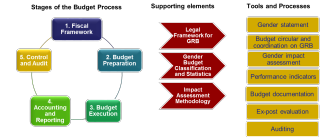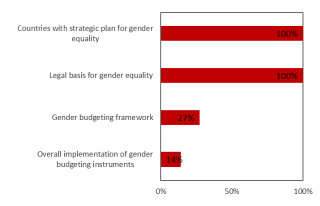
Posted by Carolina Renteria and Johann Seiwald[1]
A workshop on gender budgeting for southeastern European countries was held at the Joint Vienna Institute (JVI) from February 20-22, 2018. The event marked the initial step towards the creation of a new community of practice on gender budgeting in the region. It brought together representatives from ministries of finance and agencies/ministries responsible for gender equality from 13 countries, including Austria which is a world leader in gender budgeting.[2] The motto of the workshop was to “learn from each other”. The participants presented case studies of gender budgeting initiatives in their countries, and discussed plans, achievements, good practices, and challenges.
What is gender budgeting?
Most of the participating countries had a broad understanding of gender budgeting concepts and issues. However, there remains a lack of clarity about what gender budgeting means in practice. As was discussed in the IMF board paper on 2018 Gender Budgeting in G7 Countries[3], gender budgeting may be defined as the integration of a gender perspective into all PFM processes (see Figure 1). In short, gender budgeting is “good budgeting with a gender focus”, namely the application of the principles and practices of good budgeting from a gender angle. Gender budgeting does not only refer to women, but addresses a broader range of inequalities related to gender. It should assess the intended and unintended economic and social impact of gender-related policies, and make policy-makers aware of any biases in the design and implementation of these policies and programs.
Figure 1: Integration of Gender Budgeting into PFM
(Click on the image for better resolution)

Gender equality is a priority for all
A survey carried out before the workshop, based on an updated questionnaire, revealed that all the participating countries are committed to promote gender equality (see Figure 2). The principle of equality has been enshrined in these countries’ constitution or laws (e.g., the 2008 Constitution in Kosovo, an amendment to Montenegro’s Gender Equality Law of 2015, Bulgaria’s Gender Equality Act of 2016, and an amendment to Albania’s Organic Budget Law in 2016) and their governments have developed either national or sectoral plans to promote equality (e.g. the Croatian National Gender Equality Strategy 2017-2020, and Romania’s National Strategy for Equal Opportunities for Women and Men).
When it comes to tools and instruments to operationalize and monitor progress, no country has already implemented a comprehensive gender budgeting approach. However, some countries have plans to do so, including Albania, Bosnia Herzegovina, and Serbia. As shown in Figure 1, the coverage of gender budgeting instruments in all the countries is still in its early stages, but some countries have made progress. For example, Ukraine has announced plans to integrate gender aspects in performance budgeting, and Macedonia has issued a circular to include gender information in the budget.
Figure 2: Gender Budgeting in Southeastern Europe

(percent of countries surveyed)
Source: FAD survey, staff estimates
Bringing together the different constituencies
One striking feature of the workshop was how barriers of communication and mutual understanding between the ministries of finance and gender equality agencies represented were overcome. Fiscal and gender experts discussed and reflected on their different ideas and priorities for gender equality, the challenges for fiscal policy and gender policy, and how to work together to move forward with implementation. One country team summarized this shared understanding as creating the possibility to “promote gender equality with the same resource envelope by using available funds better”.
Developing ownership for gender budgeting
Most of the participating countries are receiving support from donors in the design of gender budgeting initiatives, and building capacity[4]. Nevertheless, an important conclusion of the workshop was that successful implementation of gender budgeting requires a country champion with the skills to bring all relevant stakeholders on board, including the council of ministers, the prime minister’s office, the ministry of finance, the legislature, internal and external auditors, and NGOs. Technical tools and instruments, together with sound analysis provide the basis for gender budgeting, but its implementation goes beyond executing these technical solutions. As one participant noted: “We are committed, give us a recipe, and we implement – unfortunately, that is not how gender budgeting works”.
Establishing a learning environment
The workshop created a good atmosphere for sharing the experiences of the participating countries and the challenges being faced, and for mutual learning. For countries which have not yet developed or enacted a strategy on gender budgeting, the workshop was especially useful. As one participant noted: “We do not have gender budgeting in many of our countries and are like first graders, but it was useful to see why and how the topic is important.” Countries that have already implemented some gender budgeting tools or strategies benefited from the discussion of good practices, and how specific issues of design and implementation might be resolved. The Austrian participants reminded the group, however, that the development of gender budgeting does not stop with its formal implementation. There is continuous need to improve the framework and to “be patient” in ensuring that its potential benefits are fully achieved.
[1] Carolina Renteria is the head of the Public Financial Management Division I in the IMF’s Fiscal Affairs Department, and Johann Seiwald is a senior economist in this division.
[2] The other countries were Albania, Bosnia Herzegovina, Bulgaria, Croatia, Kosovo, Macedonia, Moldova, Montenegro, Romania, Serbia, Slovakia, and Ukraine.
[3] https://www.imf.org/en/Publications/Policy-Papers/Issues/2017/05/12/pp041917gender-budgeting-in-g7-countries
[4] Two lecturers at the seminar, Ms. Ermira Lubani, Regional GRB Manager, UN Women, and Ms. Maja Bosnic, Team Leader of the Gender Budgeting Project in Ukraine, which is funded by Sweden, are supporting the design and implementation of GRB in the region.
Note: The posts on the IMF PFM Blog should not be reported as representing the views of the IMF. The views expressed are those of the authors and do not necessarily represent those of the IMF or IMF policy.





